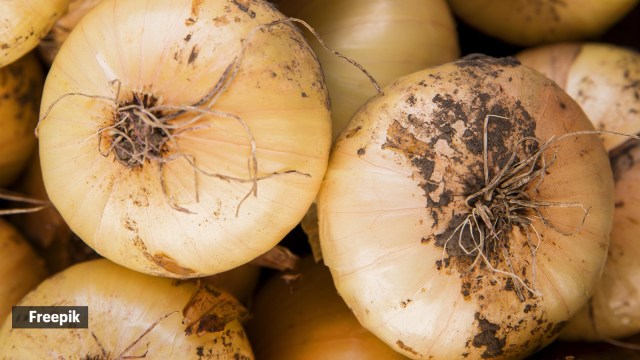📣 For more lifestyle news, click here to join our WhatsApp Channel and also follow us on Instagram
What are those black streaks and marks on your onions?
Proper storage in cool, dry, ventilated conditions is essential
 Here's what you should consider (Photo: Freepik)
Here's what you should consider (Photo: Freepik)While peeling onions, you probably would have noticed black streaks or spots on them. Are these molds? Do we discard the entire onion? We pondered over these questions and reached out to dietitians to help us understand.
Onions are nutrient-rich vegetables offering beneficial compounds such as vitamins, fibre, flavonoids (e.g., quercetin), and sulfur-containing antioxidants, all contributing to antioxidant, anti-inflammatory, and cardioprotective effects, said Kanikka Malhotra, consultant dietician and certified diabetes educator.
What causes these black streaks?
Though it may look unappetising, it’s more common than you think, and usually a matter of safe handling, not panic, said registered dietitian Garima Goyal.
The presence of black streaks caused by Aspergillus niger, a common soil fungus responsible for black mold in onions, indicates fungal contamination.
According to Goyal, these blemishes are typically caused by mold, most often from a fungus called Aspergillus niger, which thrives in soil and air. “Some streaks or spots originate on the surface or neck of the onion, especially if it was bruised or exposed to moist storage,” said Goyal.
Should you discard the onion?
Goyal asserted, “Not necessarily”.
Consuming onions contaminated with A. niger can pose health risks due to potential mycotoxin production, such as ochratoxins, which have been linked to kidney damage and other adverse effects, especially in vulnerable populations, said Malhotra.
For healthy individuals, “minimal surface contamination can be managed by removing affected layers and cooking thoroughly, but if mold penetrates deeply, the onion loses nutritional quality and safety”.
Here’s how to decide:
If the mold is superficial and confined to the outer layers, peel it away, trim generously around the area, rinse the remaining onion, and it’s generally safe to use, Goyal said.
If black mold is deeply embedded or the onion is soft and mushy, it’s safer to discard the entire bulb.
 Are they harmful to your gut? (Photo: Getty Images/Thinkstock)
Are they harmful to your gut? (Photo: Getty Images/Thinkstock)
Additionally, those with serious respiratory allergies might want to avoid handling moldy onions altogether.
From a nutritional safety standpoint, Malhotra said that onions showing black mold should be carefully assessed; damaged portions discarded to avoid ingesting fungal toxins, as these reduce the food’s nutritional integrity and may cause health issues.
How to avoid the issue
Proper storage in cool, dry, ventilated conditions is essential to prevent fungal growth and maintain onion quality.
*Store onions in a cool, dry place, preferably under 59°F (15 °C) with low humidity.
*Use within a reasonable time frame and avoid storing onions with moisture-producing vegetables like potatoes.
So, while black streaks on onions are usually just mold on the surface, most onions can still be used. “Just don’t ignore the smell or texture,” said Goyal.
DISCLAIMER: This article is based on information from the public domain and/or the experts we spoke to. Always consult your health practitioner before starting any routine.
📣 For more lifestyle news, click here to join our WhatsApp Channel and also follow us on Instagram



- 01
- 02
- 03
- 04
- 05
























